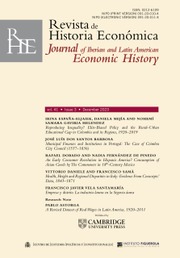Article contents
SWEET BUSINESS: QUANTIFYING THE VALUE ADDED IN THE BRITISH COLONIAL SUGAR TRADE IN THE 18TH CENTURY*
Published online by Cambridge University Press: 20 May 2014
Abstract
There has been a lot of research into the economic contribution of the periphery to European economic development during the early modern era. This paper estimates quantitatively the value added in the sugar trade from the Caribbean to Britain in the 18th century. The trade generated a value equivalent to around 1 per cent of British gross domestic product (GDP) by the early 18th century, growing to 4 per cent of GDP a century later. The results show that the sugar trade constituted a dynamic and rapidly growing part of the British economy, most importantly the tertiary sector.
Resumen
La contribución económica de la periferia hacia el desarrollo económico de Europa durante la Edad Moderna se ha investigado mucho. Este trabajo estima cuantitativamente el valor agregado en el comercio de azúcar desde el Caribe a Gran Bretaña en el siglo XVIII. El comercio generó un valor equivalente a alrededor del uno por ciento del PIB británico a principios del siglo XVIII, con un aumento de hasta el cuatro por ciento del PIB un siglo más tarde. Los resultados muestran que el comercio del azúcar constituyó un sector dinámico y de rápido crecimiento en la economía británica, más importante en el sector terciario.
Keywords
- Type
- Articles/Artículos
- Information
- Revista de Historia Economica - Journal of Iberian and Latin American Economic History , Volume 32 , Issue 2 , September 2014 , pp. 223 - 245
- Copyright
- Copyright © Instituto Figuerola de Historia y Ciencias Sociales, Universidad Carlos III de Madrid 2014
Footnotes
The author would like to thank Gregory Clark and David Beck Ryden for generously sharing their data with me. The author would also like to thank three anonymous reviewers, as well as Herbert Klein, Antonio Tena-Junguito, Franklin Knight and other participants of the Second Conference of the Caribbean Economic History Association, for many constructive comments on a presentation of a previous draft of this paper.
References
REFERENCES
- 3
- Cited by




